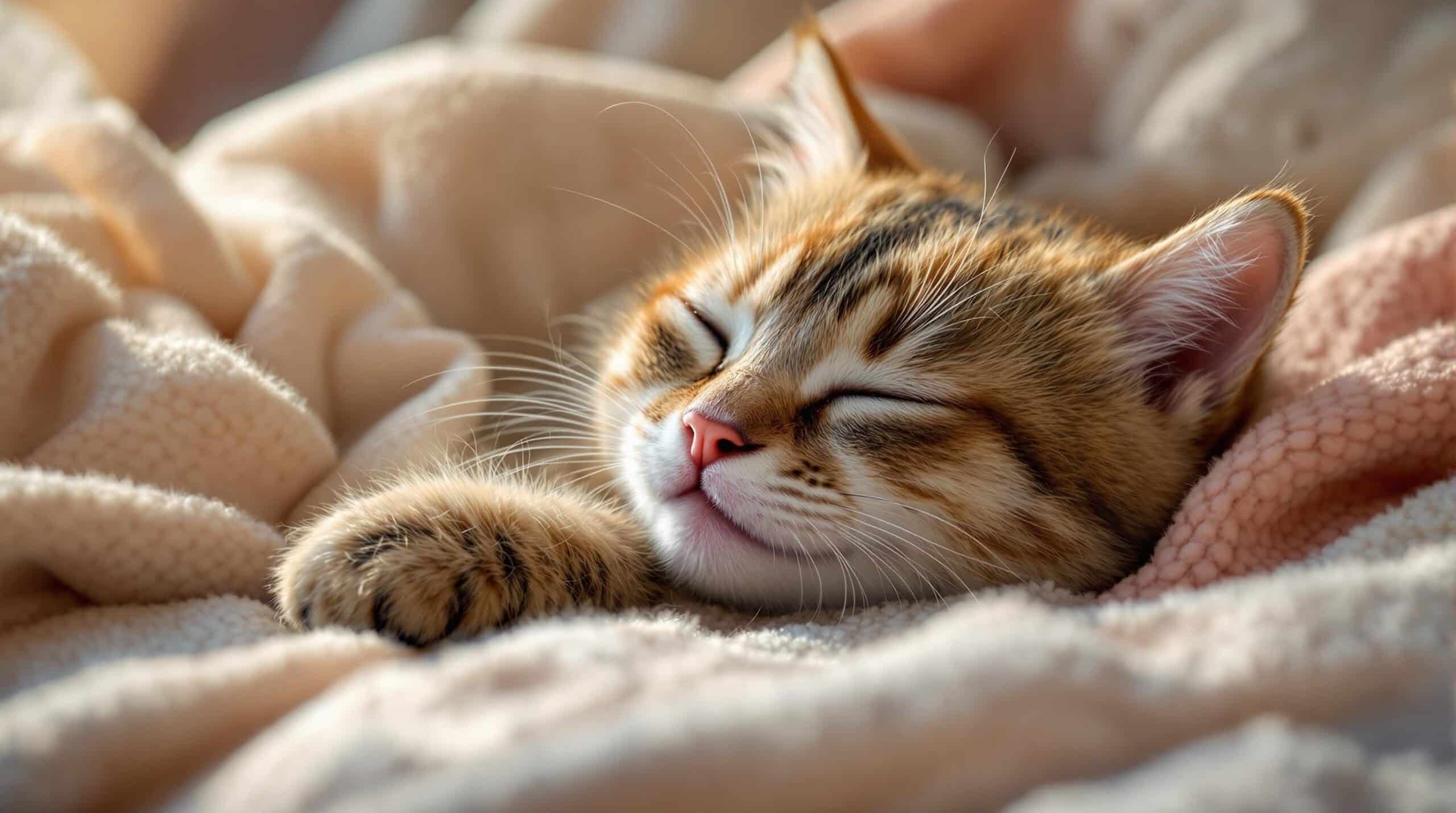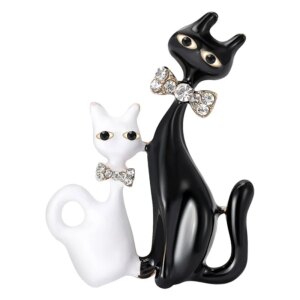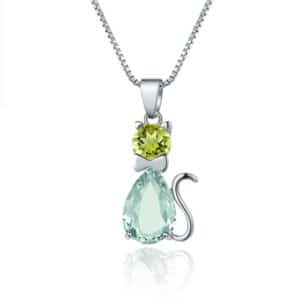Cats snoring can be a common occurrence, but it’s important to understand the underlying causes and how to manage it effectively. This article will explore the reasons behind cat snoring, the health implications, and practical solutions to ensure your feline friend gets a good night’s sleep. By the end, you’ll have a comprehensive guide to help you address and prevent cat snoring, ensuring your cat remains healthy and happy.
Causes of Cats Snoring
Obesity and Weight Management
One of the primary causes of cats snoring is obesity. Excess weight can lead to the accumulation of fat around the throat, which can partially obstruct the airway and cause snoring. Managing your cat’s weight through a balanced diet and regular exercise is crucial. Overweight cats are more prone to snoring due to the added pressure on their respiratory system. By keeping your cat at a healthy weight, you can significantly reduce the likelihood of snoring. If you need advice on cat-themed gifts or jewelry, feel free to visit our online boutique or contact us at info@catkarmacreations.com.
Allergies and Nasal Congestion
Allergies can also contribute to cat snoring. Common allergens like pollen, dust, and certain foods can cause nasal congestion, leading to snoring. If your cat is allergic to something in their environment, it can irritate their nasal passages and make it difficult for them to breathe properly. This can result in snoring and other respiratory issues. Identifying and managing allergies through environmental adjustments and dietary changes can help alleviate these symptoms. For more information on our unique and stylish jewelry, visit our Stylish Cat Lover Necklaces.
Breed and Age Factors
Certain breeds of cats are more prone to snoring due to their physical characteristics. Brachycephalic breeds, such as Persians and Himalayans, have shorter noses and narrower airways, which can lead to snoring. Additionally, older cats may experience more frequent snoring due to age-related changes in their respiratory system. As cats age, their tissues may become less elastic, making it harder for them to breathe smoothly. Understanding the impact of breed and age on snoring can help you take appropriate measures to support your cat’s health. If you’re looking for a special gift for a cat lover, check out our Elegant Cat Brooch.
Respiratory Issues
Respiratory issues, such as infections or chronic conditions like asthma, can also cause cats to snore. These conditions can lead to inflammation and congestion in the airways, making it difficult for cats to breathe normally. If your cat has a history of respiratory problems, it’s important to monitor their breathing and seek veterinary advice if you notice any changes. Early detection and treatment can help prevent snoring and other related health issues. For more information on our charitable contributions, visit our website.
Symptoms of Cats Snoring
Loud Breathing Sounds
One of the most obvious symptoms of cat snoring is loud breathing sounds. If your cat is making loud, raspy noises while sleeping, it could be a sign of snoring. These sounds can be unsettling and may indicate that your cat is having difficulty breathing. Pay attention to the volume and quality of the sounds your cat makes while sleeping, as this can provide valuable insights into their respiratory health. If you need any assistance, feel free to contact us at (800) 343-1604.
Restless Sleep Patterns
Cats that snore may also exhibit restless sleep patterns. They may move around frequently, wake up multiple times during the night, or appear to be uncomfortable. Restless sleep can be a sign that your cat is not getting the rest they need, which can impact their overall health and well-being. If your cat is having trouble sleeping, it’s important to investigate the underlying causes and take steps to improve their sleep quality. For more information on our cat-themed jewelry, visit our Silver Cat Earrings.
Open Mouth Breathing
Another common symptom of cat snoring is open mouth breathing. Cats that snore often breathe with their mouths open, which can be a sign of respiratory distress. Open mouth breathing can indicate that your cat is having difficulty getting enough air through their nose, leading to snoring and other breathing issues. If you notice your cat breathing with their mouth open, it’s important to consult a veterinarian to rule out any underlying health problems. For more information on our custom orders, visit our Contact Form.
Treatment and Remedies for Cats Snoring
Weight Management Tips
Managing your cat’s weight is one of the most effective ways to reduce snoring. A balanced diet and regular exercise can help your cat maintain a healthy weight, reducing the risk of snoring. Here are some tips for weight management:
- Feed your cat a high-quality, balanced diet that meets their nutritional needs.
- Avoid overfeeding and limit treats to prevent weight gain.
- Encourage regular physical activity through play and interactive toys.
- Monitor your cat’s weight and body condition regularly.
Humidifiers and Air Quality
Improving the air quality in your home can also help reduce cat snoring. Using a humidifier can add moisture to the air, which can alleviate nasal congestion and make it easier for your cat to breathe. Additionally, keeping your home clean and free of allergens can help reduce the risk of snoring. Consider using air purifiers and regularly cleaning your cat’s bedding and living areas to improve the air quality. For more information on our yoga-inspired items, visit our Cat Pose Yoga Block.
Veterinary Consultations
If your cat is snoring frequently or showing other signs of respiratory distress, it’s important to consult a veterinarian. A vet can perform a thorough examination to identify any underlying health issues and recommend appropriate treatments. They may suggest medications, lifestyle changes, or other interventions to help manage your cat’s snoring. Regular vet check-ups are essential for monitoring your cat’s health and ensuring they receive the care they need. For more information on our cat-themed gifts, visit our online store.
Environmental Adjustments
Making environmental adjustments can also help reduce cat snoring. Creating a comfortable sleeping environment can improve your cat’s sleep quality and reduce the likelihood of snoring. Consider the following tips:
- Provide a soft, comfortable bed or mat for your cat to sleep on.
- Ensure the sleeping area is quiet and free from distractions.
- Keep the temperature at a comfortable level for your cat.
- Use a humidifier to add moisture to the air, especially during dry seasons.
Preventing Cats Snoring
Healthy Diet and Exercise
Maintaining a healthy diet and regular exercise routine is key to preventing cat snoring. A balanced diet that meets your cat’s nutritional needs can help them maintain a healthy weight, reducing the risk of snoring. Regular physical activity can also help keep your cat’s respiratory system strong and reduce the likelihood of snoring. Here are some additional tips:
- Feed your cat a high-quality, balanced diet that is appropriate for their age and activity level.
- Provide opportunities for physical activity through play and interactive toys.
- Monitor your cat’s weight and body condition regularly to ensure they are at a healthy weight.
Regular Vet Check-Ups
Regular vet check-ups are essential for monitoring and managing cat snoring. A veterinarian can help identify any underlying health issues and recommend appropriate treatments. They can also provide guidance on diet, exercise, and other lifestyle changes that can help prevent snoring. Regular check-ups can help ensure your cat remains healthy and happy. For more information on our special pieces, visit our Lovely Peridot Crystal Cat Necklace.
Creating a Comfortable Sleeping Environment
A comfortable sleeping environment can significantly improve your cat’s sleep quality and reduce the likelihood of snoring. Consider the following tips to create a cozy and inviting sleeping space for your cat:
- Provide a soft, comfortable bed or mat for your cat to sleep on.
- Ensure the sleeping area is quiet and free from distractions.
- Keep the temperature at a comfortable level for your cat.
- Use a humidifier to add moisture to the air, especially during dry seasons.
- Place the bed in a location that is away from drafts and loud noises.
Popular Quote
“A cat improves the garden wall in sunshine and the hearth in rain.” — Nicholas Monsarrat
Statistical Fact
According to the American Pet Products Association, 38.4% of households in the United States own a cat. This statistic highlights the widespread love and care for felines, making it crucial to understand and manage issues like snoring to ensure their well-being. (Source: American Pet Products Association, 2021)
Three Tips to Manage Cat Snoring
- Monitor Your Cat’s Weight: Keep a close eye on your cat’s weight and ensure they maintain a healthy body condition. Excess weight can contribute to snoring, so a balanced diet and regular exercise are essential.
- Improve Air Quality: Use a humidifier to add moisture to the air, especially during dry seasons, and keep your home clean to reduce allergens. This can help alleviate nasal congestion and make it easier for your cat to breathe.
- Create a Comfortable Sleeping Environment: Provide a soft, comfortable bed for your cat and ensure their sleeping area is quiet and free from distractions. A cozy and inviting space can improve their sleep quality and reduce the likelihood of snoring.
Popular Questions About Cat Snoring
- Why do cats snore? Cats can snore due to various reasons, including obesity, allergies, breed characteristics, and respiratory issues. Understanding these causes can help you take appropriate measures to manage and prevent snoring.
- Is cat snoring normal? While occasional snoring can be normal, frequent or loud snoring may indicate underlying health issues. If you notice your cat snoring regularly, it’s a good idea to consult a veterinarian to rule out any problems.
- Can I prevent my cat from snoring? Yes, you can take steps to prevent cat snoring by maintaining a healthy diet, ensuring regular exercise, improving air quality, and creating a comfortable sleeping environment. Regular vet check-ups are also essential for monitoring your cat’s health.
- What should I do if my cat is snoring? If your cat is snoring, observe their breathing patterns and note any other symptoms. Consult a veterinarian if you notice any signs of respiratory distress or if the snoring is frequent and loud. Early intervention can help prevent more serious health issues.
Final Thoughts About Cats Snoring
Cats snoring can be a sign of underlying health issues, but with the right knowledge and care, you can help your feline friend sleep better and live a healthier life. Regular vet check-ups, a balanced diet, and a comfortable sleeping environment are key to managing and preventing cat snoring. If you have any concerns, don’t hesitate to contact us at info@catkarmacreations.com or call us at (800) 343-1604. We are here to help and provide you with the best cat-themed gifts and jewelry. Follow us on Facebook and Instagram for more tips and updates.
| Feature | Cat Snoring | Dog Snoring | Human Snoring |
|---|---|---|---|
| Causes | Obesity, Allergies, Nasal Congestion | Obesity, Allergies, Nasal Congestion | Obesity, Allergies, Nasal Congestion |
| Symptoms | Loud Breathing, Open Mouth, Restless Sleep | Loud Breathing, Open Mouth, Restless Sleep | Loud Breathing, Open Mouth, Restless Sleep |
| Treatment | Weight Management, Humidifiers, Vet Consultations | Weight Management, Humidifiers, Vet Consultations | Weight Management, Humidifiers, Medical Interventions |
- Understand the common causes of cat snoring, such as obesity and allergies.
- Learn how to identify the symptoms of cat snoring and when to seek veterinary advice.
- Explore practical remedies to reduce cat snoring, including environmental and dietary changes.
- Discover the importance of regular vet check-ups to monitor and manage cat snoring.
- Understand the impact of breed and age on cat snoring and how to support your pet’s health.
- Create a comfortable sleeping environment to improve your cat’s sleep quality and reduce snoring.















